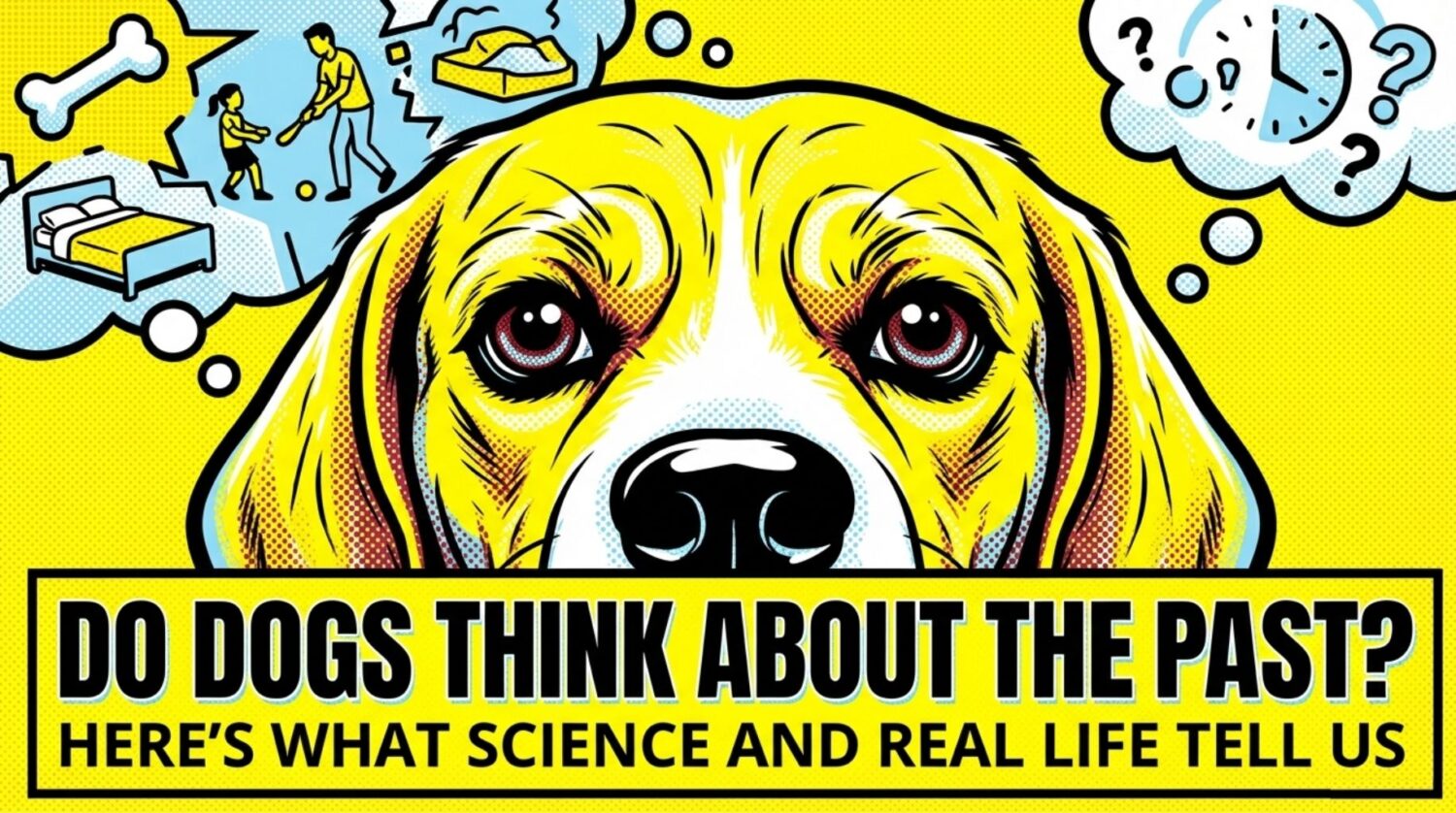Hey pack leaders! Have you’ve ever been woken by a wet nose and a sandpaper tongue assaulting your eyelid, or wondered why your socks are perpetually damp, you’ve pondered the eternal mystery: why do dogs lick you? Buckle up, grab a towel, and let’s embark on a drool-drenched adventure into the fascinating, sometimes gross, always heartfelt world of doggy licking!
Dogs licking us can feel like a mystery wrapped in slobber. From welcoming us home to calming themselves, our furry friends have more reasons than meets the eye. Today we are traveling on a journey through dog communication, instincts, and practical tips that make this natural habit both relatable and fun. By the end, you’ll understand not just why do dogs lick you, but how to embrace—or gently redirect—this affectionate ritual.
Get ready for wild science, heartwarming truths, and maybe… just maybe… the secret meaning behind that slobbery midnight face wash. Let’s fetch some answers!
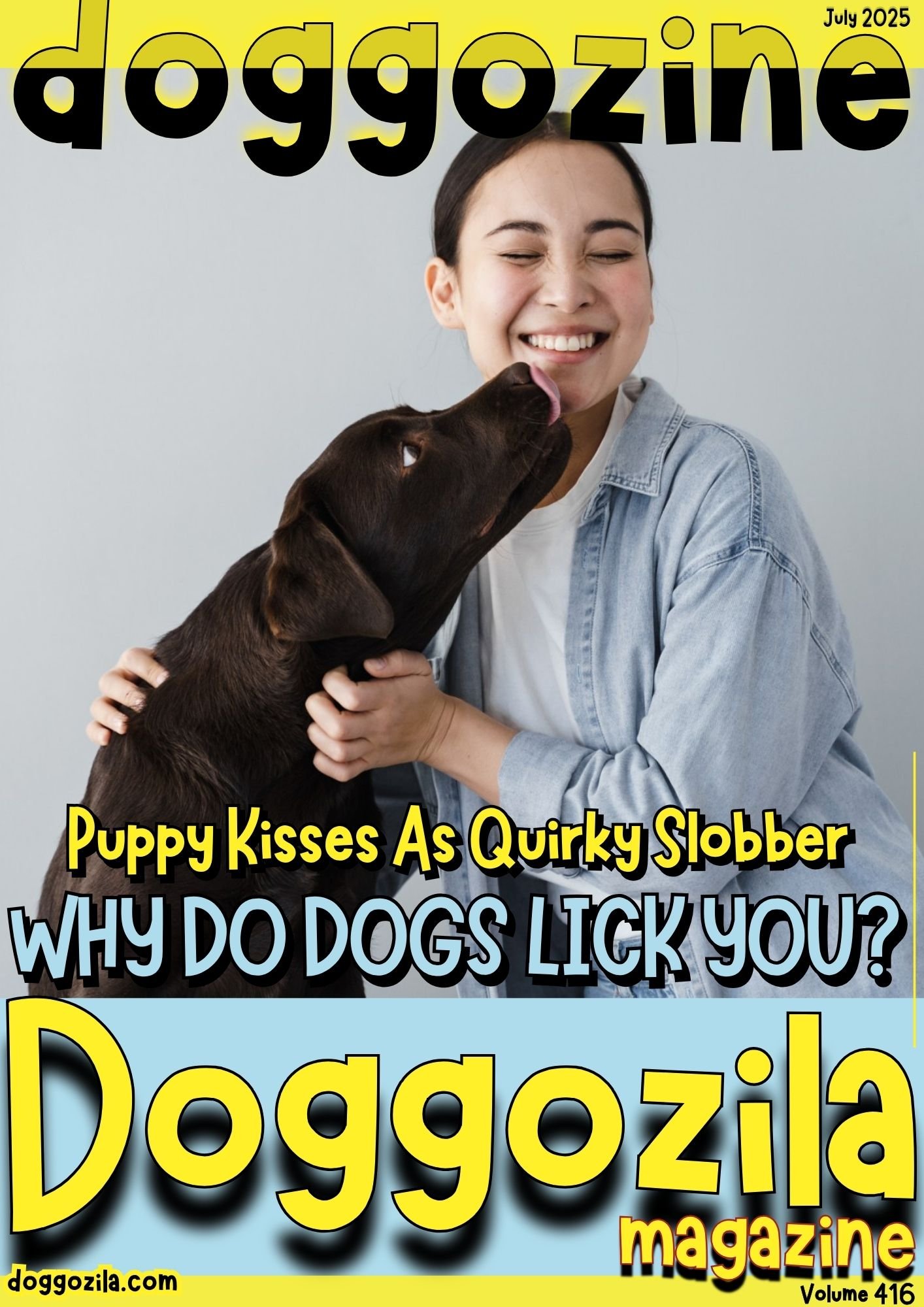
THE INSTINCTUAL BLUEPRINT: WHY DO DOGS LICK YOU AS A CARRYOVER FROM THEIR WILD ANCESTORS AND WHAT DOES IT MEANS?
Imagine a tiny wolf pup, blind and helpless in a dark den. That first tentative lick against its mother isn’t just adorable; it’s a lifeline, stimulating her to regurgitate precious food. This primal act is etched deep in your modern mutt’s DNA. When your goofy Golden retriever lavishes your face with licks, they’re tapping into ancient wolf-pack etiquette – submissive members licked the alpha’s muzzle as a sign of respect and a plea for resources. Think of it as their original “please” and “thank you” rolled into one slobbery gesture.
Studies observing modern wolves and feral dog packs confirm this ritual remains crucial for social cohesion and survival. So, that enthusiastic face-washing? It’s your pup’s instinctive way of saying, “You’re my leader, my provider, my family.” Pretty humbling, right? Understanding why do dogs lick you often starts millennia ago, echoing through their genes straight to your living room couch.
Puppyhood Programming: How Early Nursing Behaviors Explain Why Do Dogs Lick You Later in Life?
From the moment they’re born, puppies experience the world largely through their mouths. That instinctive nuzzling and licking at their mother’s belly isn’t just for milk; it’s their first communication, their first bonding experience. Landmark research tracking puppy litters found that pups who engaged most actively in gentle licking with littermates developed stronger social skills as adults.
This early association – licking equals comfort, security, and good things (like milk!) – becomes deeply ingrained. When your adult dog licks your hand or face, they’re often recreating that profound sense of comfort and connection learned in infancy. It’s their way of saying, “You make me feel safe and loved, just like mom did.”
Breeds historically bred for close companionship, like Cavalier King Charles Spaniels, often exhibit this “comfort licking” more intensely. Recognizing this deep-seated instinct helps us appreciate those sloppy kisses not as mere habit, but as a profound expression of trust and belonging rooted in their very first days. This is a core piece of understanding why do dogs lick you with such persistence and tenderness.
The Alpha Myth Updated: What Modern Science Says About Submission and Affection in Licks?
Forget the outdated dominance theories! Modern ethology paints a richer picture. While licking can signal deference in specific contexts (like appeasing a grumpy playmate), its primary function in the human-dog bond is overwhelmingly affiliative – it’s about building and maintaining social bonds. Think of it less like bowing to a king and more like a friendly handshake or hug among equals who deeply care for each other. Your dog licks you primarily because they adore you and feel connected to you.
Research analyzing interactions in multi-dog households shows friendly licking occurs most often between bonded pairs, regardless of strict hierarchy. So, when your goofy Great Dane tries to lick the top of your head, it’s far more likely a sign of deep affection and social closeness than them seeing you as the “pack omega.” Understanding why do dogs lick you requires seeing it through the lens of friendship and mutual affection, a beautiful testament to the unique social bridge they’ve built with us.
🔑 Key Points: Licking originates from wolf pup behavior, stimulating mothers for food and showing submission to pack leaders. Modern dogs retain this instinct to express respect and bond with their human “pack.”
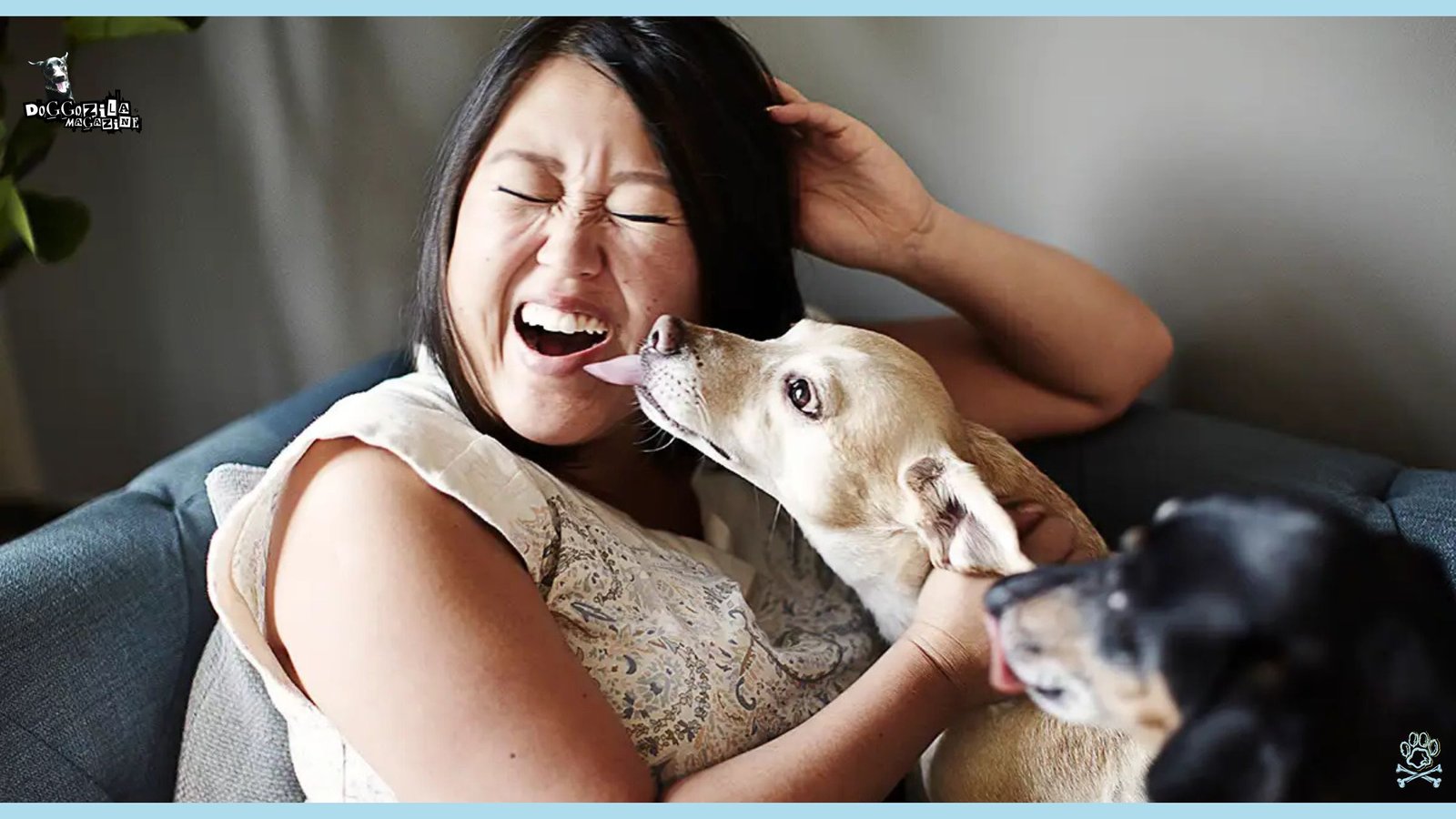
BEYOND PUPPY LOVE: DECODING THE MULTITUDE OF MESSAGES HIDDEN IN EVERY SLURP!
Dogs lick for a kaleidoscope of reasons. It’s communication, exploration, self-soothing, and sometimes, even a health indicator. That determined lick on your knee could be curiosity about the new lotion you used, an attempt to calm their own nerves during a thunderstorm, or simply because your skin tastes interestingly salty after your run.
While affection is a huge driver, reducing licking to just “kisses” is like saying the ocean is just water – there’s incredible depth beneath the surface! They experience the world profoundly through taste and smell, and licking is a key tool in their sensory toolkit. Ignoring the complexity misses the fascinating conversation your dog is trying to have!
Taste Bud Detectives: Exploring the Delicious (and Sometimes Weird) Flavors That Attract Your Dog’s Tongue
Let’s face it: to a dog, you are a walking, talking snack bar! Your skin is a landscape of intriguing tastes: salty sweat (especially after a workout – hello, electrolytes!), lingering traces of your morning bacon, the oily residue from your pizza slice, lotions, soaps, even the faint metallic tang of your blood if you have a tiny cut.
Their sense of smell, thousands of times stronger than ours, amplifies these flavors exponentially. A quirky study presented dogs with clean skin vs. skin rubbed with chicken broth; the broth-scented skin received significantly more and longer licks. It’s not necessarily hunger; it’s opportunistic scavenging hardwired from ancestors who couldn’t afford to miss a potential calorie source.
So, why do dogs lick you after you cook dinner or come home from the gym? Often, it’s simply because you smell and taste fascinating! While usually harmless, be mindful of toxic residues (like onion or garlic on your hands) and gently redirect overly enthusiastic tasting sessions.
The Anxiety Antidote: How Repetitive Licking Acts as a Dog Coping Mechanism?
Not all licks are happy licks. Just like humans might bite their nails or twirl their hair, dogs often use licking as a self-soothing mechanism for anxiety. The rhythmic motion releases endorphins, providing temporary relief from stress. Common triggers include separation anxiety (cue the frantic licking as you grab your keys), loud noises (fireworks, thunderstorms), unfamiliar environments, or changes in routine.
Watch for the quality of the lick: anxious licking tends to be more focused, repetitive, almost trance-like, and might extend to objects, furniture, or themselves (like dog licking paws). Breeds prone to nervousness, such as German Shepherds or Vizslas, are often champion stress-lickers.
If your dog suddenly starts licking you or surfaces obsessively during stressful events, it’s a clear signal they’re feeling overwhelmed and trying to cope. Recognizing this why do dogs lick you scenario is crucial for providing comfort (a safe space, calming aids, or behavior modification) rather than misinterpreting it as affection gone wild.
🔑 Key Points: Early nursing behaviors link licking to comfort and security. Adult dogs often lick humans to recreate this profound sense of safety and affection learned as puppies.
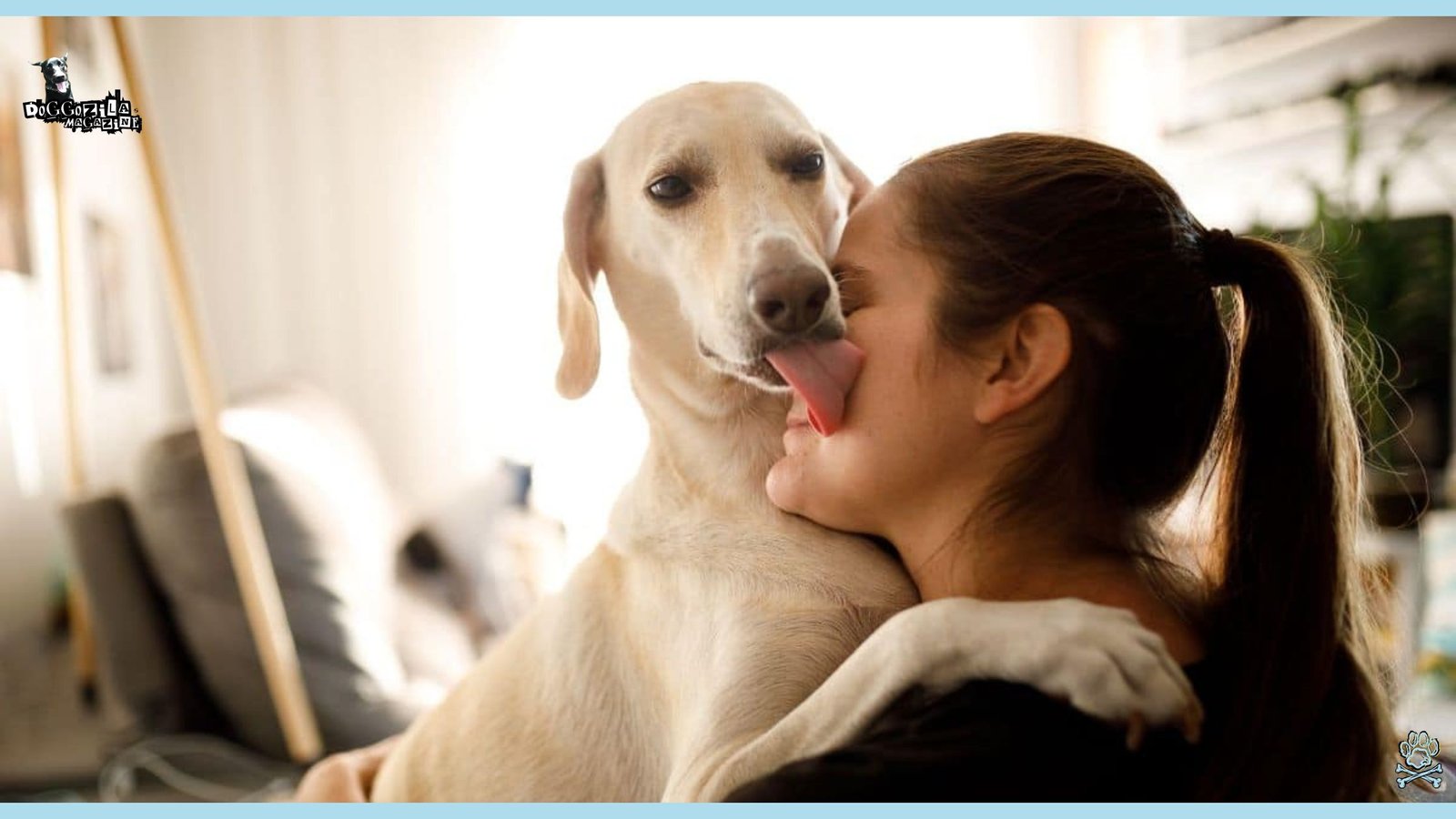
CAN HABITUAL LICKING OFFER CLUES ABOUT YOUR DOG’S EMOTIONAL HEALTH?
Patterns of licking—like timing, duration, and target areas—can spotlight your dog’s internal state. In many cases, chronic licking indicates underlying anxiety, allergies, or even neurological conditions. For instance, dogs suffering canine compulsive disorder may fixate on licking furniture or people as a self-soothing strategy.
By consulting a veterinarian and tracking licking incidents, owners can differentiate between normal affection and red-flag behaviors. Addressing the root cause—whether through environmental enrichment, training adjustments, or medical intervention—transforms licking into a window for better pet care.
Do Dogs Lick You To Cope With Anxiety Or Compulsive Behaviors?
When stress or boredom overwhelms a dog, licking becomes a go-to self-calming tactic, much like nail-biting in humans. A landmark 2017 paper in Veterinary Clinics of North America highlighted how behavior modification and anti-anxiety pheromone collars reduced excessive licking in 80% of studied cases.
If your furry friend licks door frames, blankets, or your limbs repetitively, it’s time to seek professional guidance. Introducing puzzle feeders, structured walks, and positive reinforcement can redirect compulsive licking into healthy outlets.
Do Dogs Lick You To Explore Possible Allergies Or Skin Irritations?
Sometimes what appears as affection is simply your dog’s attempt to alleviate an itch or irritation on your skin. When grooming themselves, dogs instinctively lick areas that feel odd—be it dry skin, sunscreen residue, or laundry detergent scents.
If you notice your pup targeting the same spot on your arm, check for chemical irritants in soaps or lotions. Adjusting your skincare or laundering routine can curb unwanted licking, while giving your dog special grooming treats keeps them engaged in positive, controlled licking.
Do Dogs Lick You To Monitor Your Well-Being?
Some therapy dogs are trained to detect blood sugar drops, migraines, or emotional distress through licking. Medical research from Penn Vet’s Working Dog Center has shown that diabetes-alert dogs often signal hypoglycemia by licking their owner’s hands or face.
Similarly, psychiatric service dogs use careful licking patterns alongside nudges to guide handlers toward safety. These working partnerships underscore how licking evolved into a powerful communication tool, bridging the gap between canine senses and human needs.
🔑 Key Points: Repetitive, focused licking releases endorphins, acting as a self-soothing strategy for stress (e.g., separation anxiety, storms). It’s akin to human nail-biting.
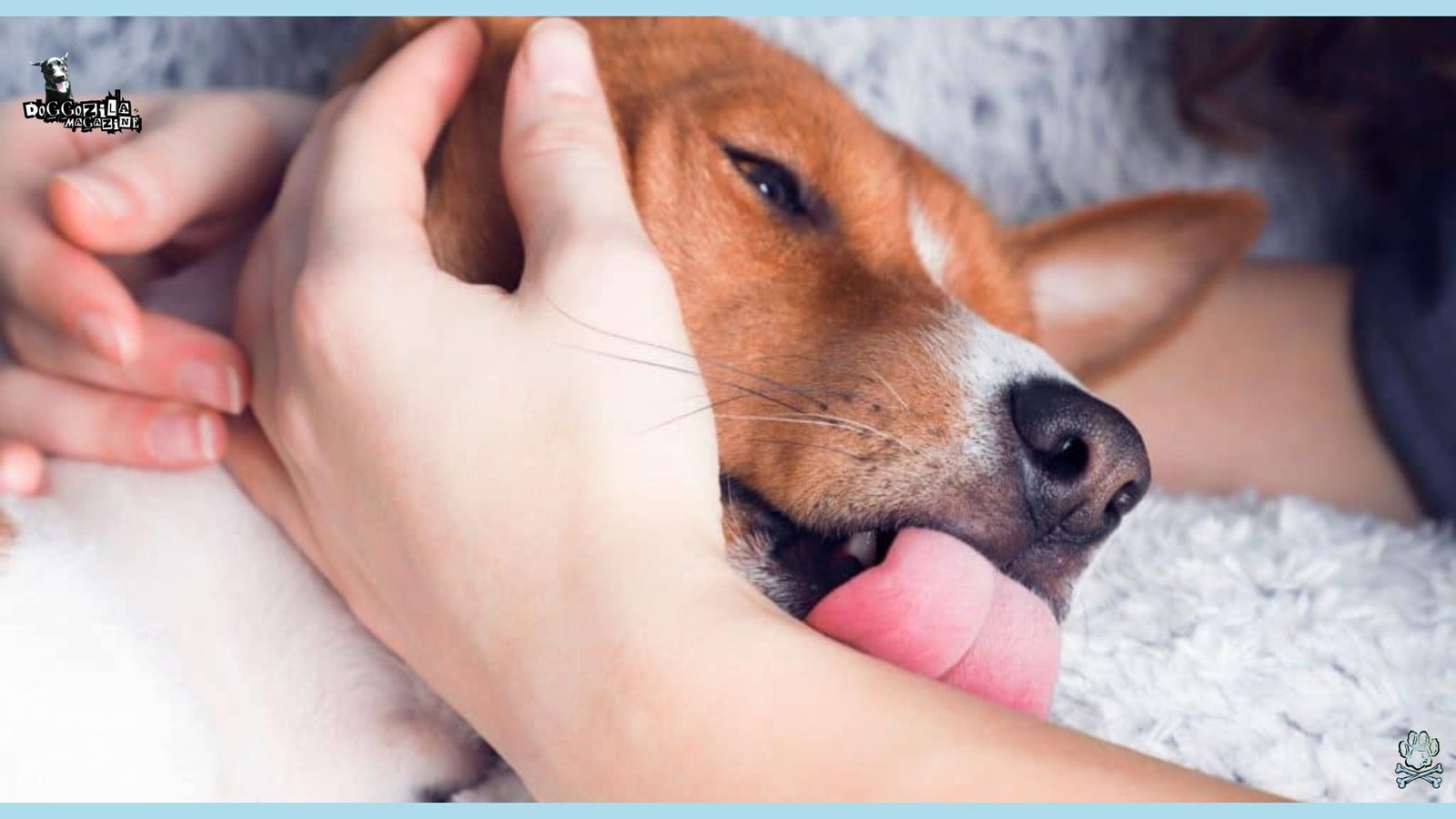
COULD YOUR DOG’S LICKS BE TRYING TO TELL YOU SOMETHING VITAL? UNCOVER WHY DO DOGS LICK YOU!
While we shouldn’t rely on them as our primary physician, there are fascinating cases where persistent, focused licking has hinted at underlying health issues in their humans. It adds a whole new layer to understanding why do dogs lick you – it might be more than just affection or taste!
This one might blow your mind: sometimes, your dog’s tongue is acting like a furry, four-legged diagnostic tool. Dogs possess an incredible ability to detect subtle changes in our bodies through scent and taste.
The Dog Polygraph: Investigating Cases Where Persistent Licking Detected Human Health Shifts
The science behind this is rooted in dogs’ extraordinary olfactory prowess. They can detect volatile organic compounds (VOCs) associated with various physiological changes, including some illnesses. Famous cases exist, like dogs repeatedly sniffing or licking a specific spot on their owner that later turned out to be a melanoma.
Diabetic alert dogs are trained to recognize the scent of low or high blood sugar. While your untrained pet isn’t a certified medic, anecdotally, many owners report their dogs becoming unusually fixated on licking a particular area – a mole, a joint, or their breath – before a diagnosis.
A documented case study involved a dog obsessively licking its owner’s ankle; medical tests later revealed a small, deep-seated infection the owner was unaware of. If your dog suddenly develops an intense, localized licking habit focused on you, especially if it seems out of character, it’s worth paying attention and possibly mentioning to your doctor. It might be their unique way of saying, “Hey, something smells different here!”
The Salt-Seeking Superpower: Understanding the Biological Drive Behind Sweat and Tear Licking
Ever cry and suddenly find your dog intently licking your face? Or finish a run and become their personal salt lick? There’s solid biology at play! Sweat and tears contain electrolytes like sodium, potassium, and chloride – minerals essential for bodily functions. While dogs get most of their electrolytes from food, the taste is inherently appealing to them, a remnant of their evolutionary drive to seek out vital nutrients wherever possible.
Research comparing canine interest found dogs spent significantly more time licking skin samples with sweat versus clean skin. Tears, being salty and potentially carrying emotional scents (stress hormones), are similarly attractive. So, why do dogs lick you when you’re sweaty or emotional?
It’s likely a combination of the appealing salty taste and an instinctive response to your heightened emotional state – they might be drawn to the salt and trying to offer comfort through a familiar behavior. It’s a weirdly sweet, albeit slightly gross, display of their attentiveness.
🔑 Key Points: Persistent, focused licking can sometimes signal underlying health issues in humans (e.g., infections, blood sugar changes detected by scent) or in the dog themselves (allergies, pain, nausea, anxiety). Unusual licking warrants attention.
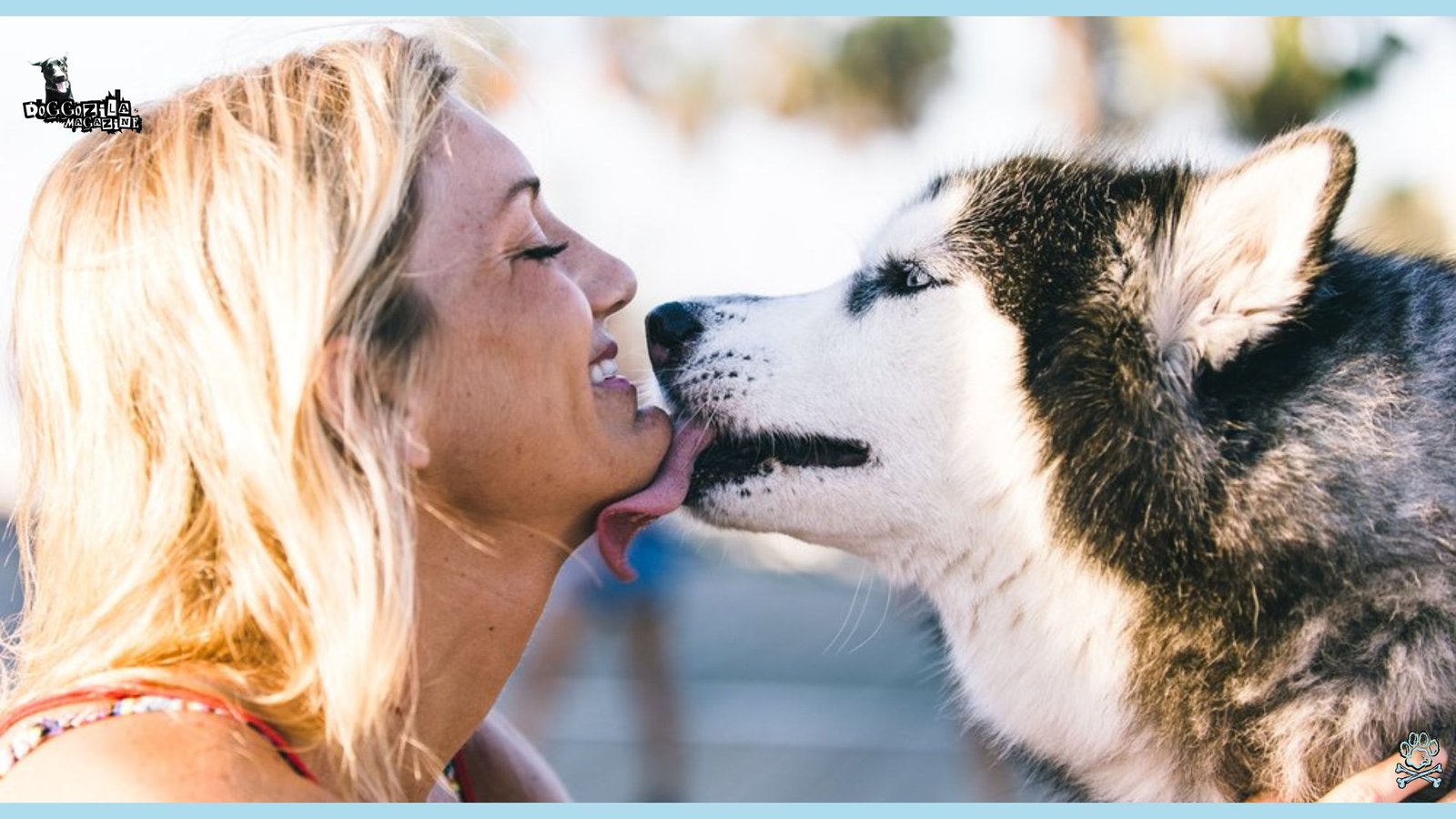
WHEN LICKING TIPS INTO TROUBLE: RECOGNIZING COMPULSIVE BEHAVIOR AND HEALTH RED FLAGS IN YOUR DOG!
While licking is usually normal, it’s crucial to recognize when it crosses the line into a potential problem for the dog. Excessive, obsessive licking – whether directed at you, objects, or themselves (especially paws, legs, or flanks) – can signal underlying medical or psychological issues that need attention. Ignoring it can lead to painful sores (“hot spots“), infections, and worsening anxiety.
Allergies (food/environmental) often cause itchy skin, leading to obsessive paw or body licking. Pain (like arthritis) might make a dog lick joints. Dental issues or nausea can trigger air-licking or lip-licking. If your dog’s licking seems frantic, focused on one spot, or interrupts sleep/eating, consult your vet. It’s not “just a habit” if it’s harming their well-being.
Allergies, Pain, or Just Boredom? Solving the Puzzle of Excessive Self-Licking
Is your dog constantly licking their paws raw or gnawing at their flank?
The culprits are often:
- Allergies: Environmental (pollen, dust mites) or food allergies are a huge cause of itchy skin, driving dogs to lick incessantly for relief. Look for red skin, hair loss, recurrent ear infections, and licking that worsens seasonally.
- Pain or Discomfort: Arthritis might cause a dog to lick a sore joint. An internal issue like nausea or gastrointestinal upset can manifest as frequent lip-licking or air-licking. A foreign body (like a grass seed) or localized injury can also trigger focused licking.
- Parasites: Fleas, mites, or ticks are classic itch-inducers.
- Boredom or Stress: Lack of mental and physical stimulation can lead to obsessive licking as a coping mechanism. So, why do dogs lick you obsessively might sometimes tie into their anxiety, not yours.
A detailed diary tracking when and where licking occurs, plus a thorough vet exam (including skin scrapings and potential allergy testing), is essential to pinpoint the cause. Treating the root issue (allergy meds, pain relief, parasite control, increased enrichment) is key to stopping the cycle.
The Phantom Lick Chronicles: What Air-Licking and Blanket-Sucking Really Mean
Some canine licking behaviors are downright bizarre. Does your dog lick the air compulsively? Or suck/lick soft blankets obsessively?
- Air Licking/Gulpiness: This can often signal nausea, acid reflux, or dental pain (like an abscessed tooth). It can also be a focal seizure sign in some cases. Senior dogs with cognitive decline might exhibit aimless air licking.
- Blanket/Fabric Sucking: This behavior, sometimes seen in breeds like Dobermans, is often linked to early weaning and can become a compulsive self-soothing habit. It might also relate to pica (eating non-food items) driven by nutritional deficiencies or anxiety.
These behaviors are rarely “just quirky habits.” Persistent phantom licking warrants a vet visit to rule out medical causes. If medical issues are cleared, consulting a certified veterinary behaviorist can help address potential compulsive disorders through environmental management and behavioral modification.
🔑 Key Points: Modern science debunks strict dominance theory. Licking primarily functions as affiliative behavior (like a hug) to build and maintain social bonds based on mutual affection, not submission.
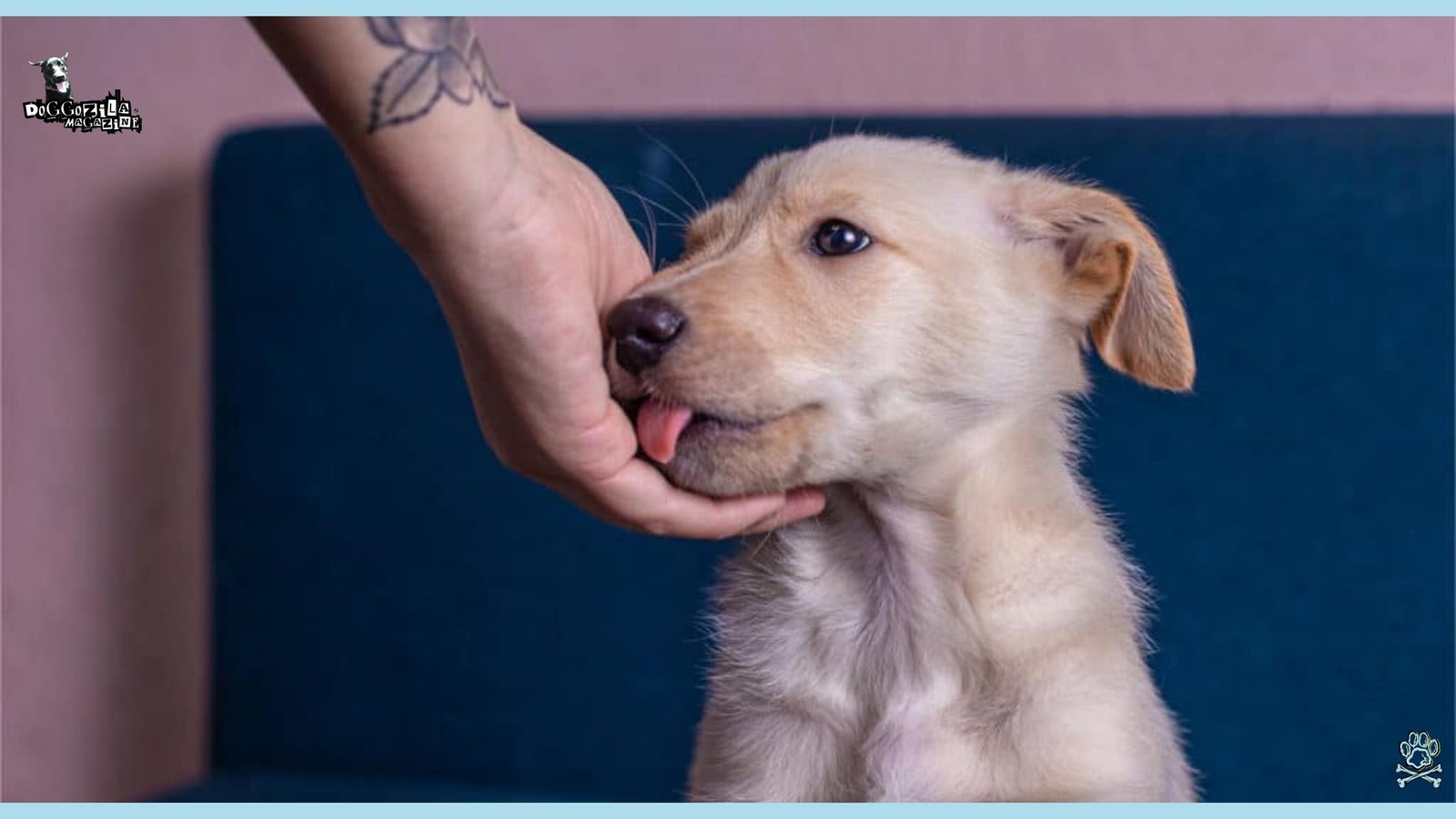
BREED SPOTLIGHT & QUIRKS: WHY DO DOGS LICK YOU DIFFERENTLY? FROM GENTLE NUDGES TO FULL-FACE WASHES!
Not all licks are created equal! Your dog’s breed (or mix) significantly influences their licking style and intensity. Understanding these tendencies helps decode their intent and manage expectations – a Mastiff’s “kiss” is a very different experience from a Papillon’s!
Licking isn’t one-size-fits-all! Breeds and cultures shape this behavior. Retrievers, bred for soft-mouthed retrieving, often lick gently. Herding breeds might nip-lick during play. In some cultures, dog licking is discouraged; in others, it’s embraced. Urban dogs might lick less due to busier lifestyles versus farm dogs with closer bonds. It’s a fascinating global tapestry of tongue-talk!
The Delicate Dabbers vs. The Enthusiastic Swabbers: How Genetics Shape Licking Style
- Retrievers (Labs, Goldens): Bred for “soft mouths” to carry game without damage, they often lick with gentle, broad strokes. It’s usually affectionate and enthusiastic but less abrasive.
- Herding Breeds (Border Collies, Aussies): May incorporate quick, nippy licks (“herding licks“) during play or when trying to direct movement. Can be more intense and focused.
- Scent Hounds (Beagles, Bloodhounds): Often combine licking with intense sniffing, especially on skin or clothes. May be more persistent when following an interesting scent residue. Expect drool!
- Companion Breeds (Cavaliers, Shih Tzus): Tend to use licking frequently as a primary affectionate gesture, often aiming for faces. Can be soft and persistent.
- Giant Breeds (Mastiffs, Newfoundlands): Prepare for a full-face wash! Their sheer tongue size and sometimes more “sloppy” technique means you’ll know you’ve been loved on. It’s often deeply affectionate but undeniably wet.
Knowing your breed’s tendencies helps you appreciate their unique “lick language” without getting frustrated by what might just be their genetic programming. Why do dogs lick you with such variation? Often, it’s written in their breed’s history.
Living Happily (and Hygienically) with the Lick: Practical Tips for Managing Your Dog’s Tongue!
Love the sentiment but could do without the slobber on your glasses? Want to curb obsessive licking for your dog’s well-being? It’s all about setting kind, consistent boundaries and providing alternatives.
Training “Gentle Kisses”: Positive Techniques to Shape Polite Licking Behavior
You don’t have to squash the affection, just refine it!
- The “Enough” Cue: Calmly say “Enough” or “Okay,” gently withdraw your attention (stand up, turn away), and wait for a brief pause in licking. Immediately reward the pause with calm praise or a treat. Consistency is key!
- Teach an Alternative Behavior: Train a rock-solid “Sit” or “Touch” (nose boop to your hand). Ask for this behavior before they start licking or as soon as they pause. Reward generously! This redirects their impulse politely.
- Manage the Situation: If face licking bothers you, avoid putting your face near theirs when they’re excited. Pet them on the chest or side instead. If they lick when you greet them, stay calm and neutral until they settle.
- Reward Calm Interaction: Lavish praise and pets when they show affection without licking – a gentle lean, a soft gaze, or just sitting calmly beside you.
Never punish licking; it’s natural communication. Positive reinforcement teaches them how to interact in a way that works for both of you. Understanding why do dogs lick you helps you respond with patience and training, not frustration.
Lick Mats, Kongs & Frozen Broth: Channeling the Urge into Awesome Enrichment
Give your dog a fantastic outlet for their licking instinct!
- Lick Mats: Spread dog-safe peanut butter, plain yogurt, pureed pumpkin, or wet food onto a silicone lick mat and freeze it. Provides prolonged, satisfying licking.
- Stuffed Kongs & Toys: Pack rubber toys with a mixture of kibble, treats, and broth or wet food, then freeze. Keeps them busy licking and working for the goodies.
- Frozen Broth Cubes: Pour low-sodium chicken or beef broth into ice cube trays. A cool, tasty licking treat.
- Hide-and-Seek Sniffing: Hide small treats around a room or snuffle mat. Uses their nose and brain, tiring them out and reducing anxiety-driven licking.
These tools satisfy their natural licking drive in a constructive, enriching way, reducing the likelihood of them using you or the furniture as their primary lick target. A mentally and physically stimulated dog is less likely to lick excessively out of boredom or anxiety.
🔑 Key Points: Breed genetics heavily influence licking style (e.g., gentle Retrievers vs. sloppy Mastiffs). Manage unwanted licking humanely through positive training (“Enough” cue, redirection), enrichment (lick mats, Kongs), and understanding breed tendencies.
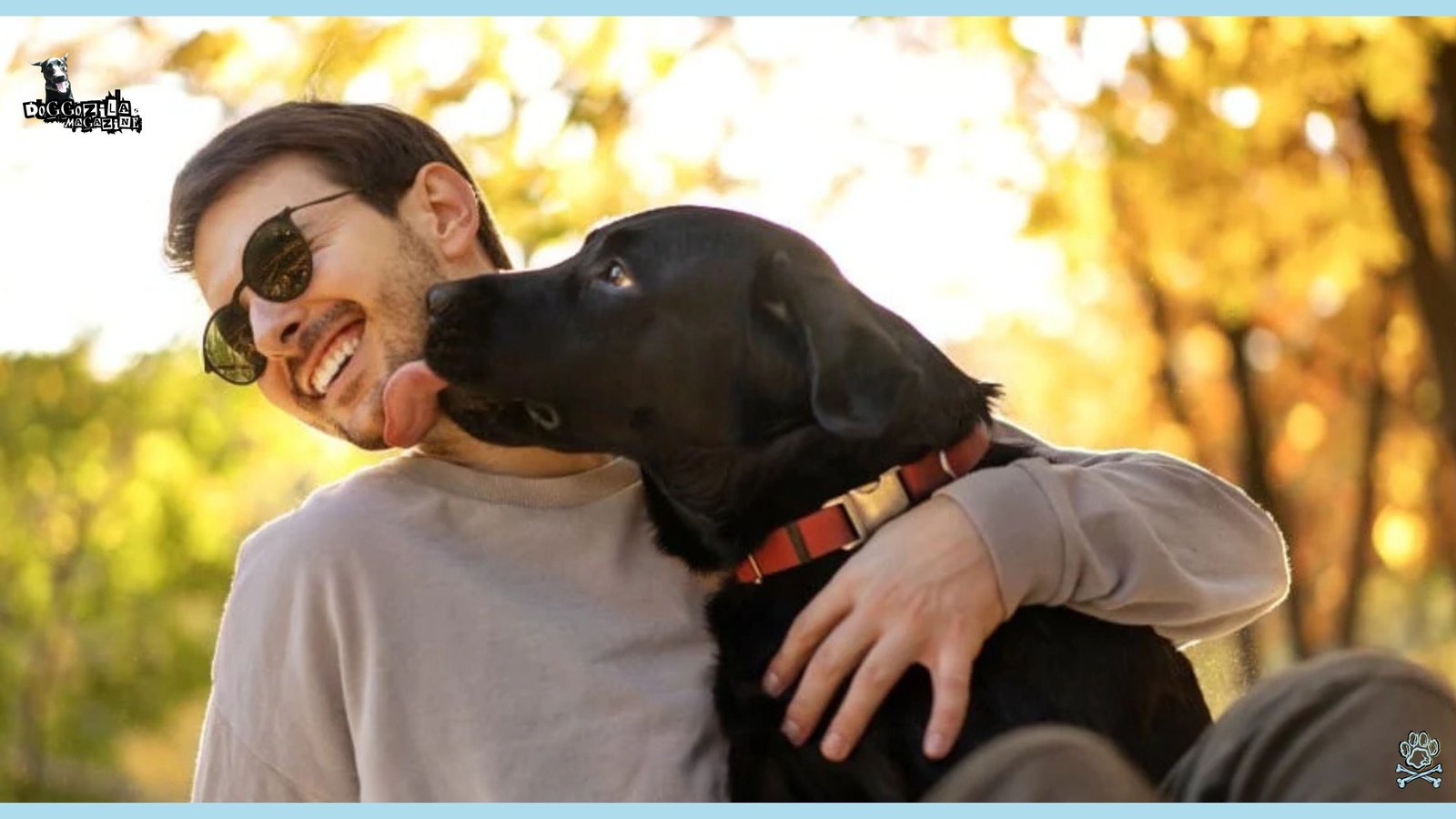
ADVENTURE TALES AND CASE STUDY ABOUT WHY DO DOGS LICK YOU
If your dog still struggles with compulsive licking despite consistent training, consulting a certified dog trainer or veterinary behaviorist can reveal hidden triggers. They’ll assess your dog’s daily routine, nutritional profile, and environment to craft a personalized plan, which may include desensitization exercises or short-term behavioral medication.
Adventure Tale: Luna’s Alpine Wake-Up Licks
On a misty mountain morning, my German shepherd, Luna, greeted me with a series of deliberate licks before we strapped on our hiking pack. She’d watched deer tracks all night and knew I’d need bolstering for the climb ahead—her salute tasted of adventure and loyalty in equal measure.
A behavioral research group later mapped similar patterns in high-altitude working dogs, linking instinctive licking to heightened pack readiness and social bonding under stress. That spontaneous dawn ritual, now woven into my routine, taught me that licking is also a motivational engine, fueling mental and physical prep for the day’s challenges.
Case Study: Turkey Trot Tails And Taste
In a quirky 2022 veterinary trial at the University of Edinburgh, agility dogs wore sweat-detecting harnesses that tracked their sodium output. The more vigorous the run, the more intensely dogs licked handlers afterward, showcasing a direct link between exercise, sweat composition, and licking behavior.
Trainers began using flavored cooling vests pre-race, noting a smoother post-run transition when pups had a controlled salty taste outlet. These innovative insights highlight how dissecting licking through scientific lenses can refine training protocols and strengthen the emotional bond you share with your dog.
Adventure Anecdote: Midnight Spa Under The Stars
During a backyard camping trip, my terrier mix, Jasper, insisted on grooming me with affectionate licks after our moonlit brush session. He’d felt the wind ruffle through his coat and wanted me to experience the same sensation—a canine gesture of sharing comfort.
Inspired, I launched a starlit routine: gentle brushing, a bit of coconut oil on my hands, and Jasper’s enthusiastic reciprocation under the Milky Way. That ritual became our nightly wind-down, blending grooming, bonding, and playful exploration into one unforgettable adventure.
🔑 Key Points: Humans taste interesting to dogs! Salt from sweat/tears, food residues, lotions, and skin oils are highly appealing due to their powerful sense of smell, driving much licking behavior.
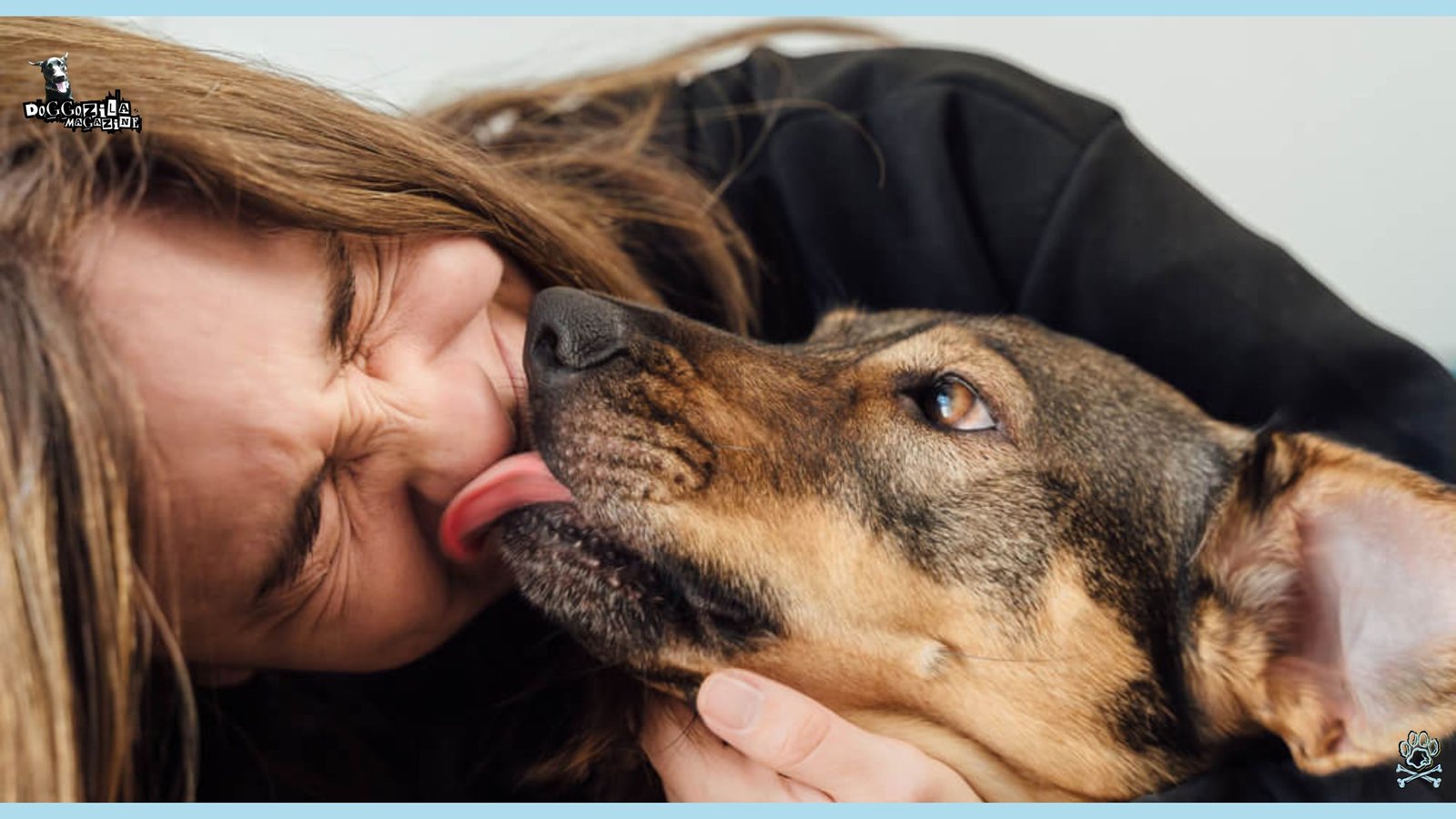
THE FINAL SLURP: EMBRACING THE MESSY, MEANINGFUL LANGUAGE OF DOGGY KISSES!
So, why do dogs lick you? As we’ve journeyed through dens, DNA, taste buds, and emotions, the answer is beautifully complex: it’s instinct, affection, communication, exploration, comfort, curiosity, and sometimes, a subtle health nudge all rolled into one wet, wonderful gesture. It’s their ancient wolf heritage whispering through their domestic bliss, their way of saying “I love you,” “What’s that taste?,” “I’m here,” and “You’re mine.”
While setting boundaries for hygiene or sanity is perfectly okay, let’s never forget the profound connection and trust behind most of those sloppy Oscars. Next time your pup baptizes your keyboard, just sigh, smile, and remember the million-year-old conversation we’re having. Keep those tails wagging and those tongues (mostly) in check!
Fun and Safe Ways to Manage (and Enjoy!) Your Dog’s Licking Habit!
Love licks but need boundaries? Train a “gentle” cue for softer licks. Use distraction – toss a ball when they lick too much. Keep skin clean if sensitive. Forbidden areas? Consistently say “no” and offer a chew. Remember: never punish licking; it’s natural communication. Channel the urge productively with lick mats or frozen broths. Celebrate the love behind the slobber!
Training Tactics: Teaching Your Dog “Lick Manners” Without Crushing Their Spirit
Positive reinforcement works wonders! Reward brief, calm licks; ignore/redirect intense ones. Teach “enough” by stopping interaction when licking escalates. My favorite trick? Train “target” – have them nose-boop your hand instead of licking. It redirects politely! Consistency teaches them human skin isn’t a lollipop, while honoring their need to connect. Win-win!
Lick Mats, Puzzles, and Frozen Treats: Channeling the Urge Creatively
Turn licking energy into enrichment! Smear yogurt or pumpkin on a silicone lick mat and freeze it. Stuff rubber toys with mashed banana. These tools satisfy licking instincts constructively, reducing unwanted human-licking. Plus, mental stimulation tires them out! A tired dog is a polite dog… mostly.
So, next time your furry linguist gives you a wet dissertation, smile! Whether it’s love, curiosity, salt, or stress, you’re now fluent in Lick-ish. Share your wildest licking stories below – has your dog ever “diagnosed” something with their tongue? Stay pawsome, keep those tails wagging, and maybe keep a towel handy!
Paws and Reflect: Top Questions Answered About Why Do Dogs Lick You!
In weaving together biology, behavior, and adventure, you now have a comprehensive map to decode why dogs lick you. Armed with research insights, real-life tales, and practical tips, you can transform each wet greeting into a deeper understanding of your furry friend. So, if all that doesn’t answered your question, we have answered another few questions on this topic that can help you.
- Q: Is it safe to let my dog lick my face?
- A: Generally, yes for healthy adults, but avoid eyes, nose, mouth, and open wounds. Be extra cautious if you have a compromised immune system. Wash your face afterwards!
- A: Generally, yes for healthy adults, but avoid eyes, nose, mouth, and open wounds. Be extra cautious if you have a compromised immune system. Wash your face afterwards!
- Q: My dog licks the couch constantly. What gives?
- A: Could be anxiety, boredom, a residual tasty spill, or pica. Rule out medical issues first, then look at enrichment and potential anxiety triggers.
- A: Could be anxiety, boredom, a residual tasty spill, or pica. Rule out medical issues first, then look at enrichment and potential anxiety triggers.
- Q: How can I tell if my dog’s licking is anxiety-driven?
- A: Look for context (during storms, when alone), body language (panting, pacing, tucked tail), and the licking itself (focused, repetitive, trance-like).
- A: Look for context (during storms, when alone), body language (panting, pacing, tucked tail), and the licking itself (focused, repetitive, trance-like).
- Q: Why does my dog lick my other dog’s ears?
- A: Usually social bonding or grooming behavior! Sometimes they enjoy the taste of earwax. Ensure the ears are healthy (no redness, odor, discharge).
- A: Usually social bonding or grooming behavior! Sometimes they enjoy the taste of earwax. Ensure the ears are healthy (no redness, odor, discharge).
Licking serves many purposes beyond affection: communication, sensory exploration (taste/smell), self-soothing, curiosity, and sometimes signaling health concerns.
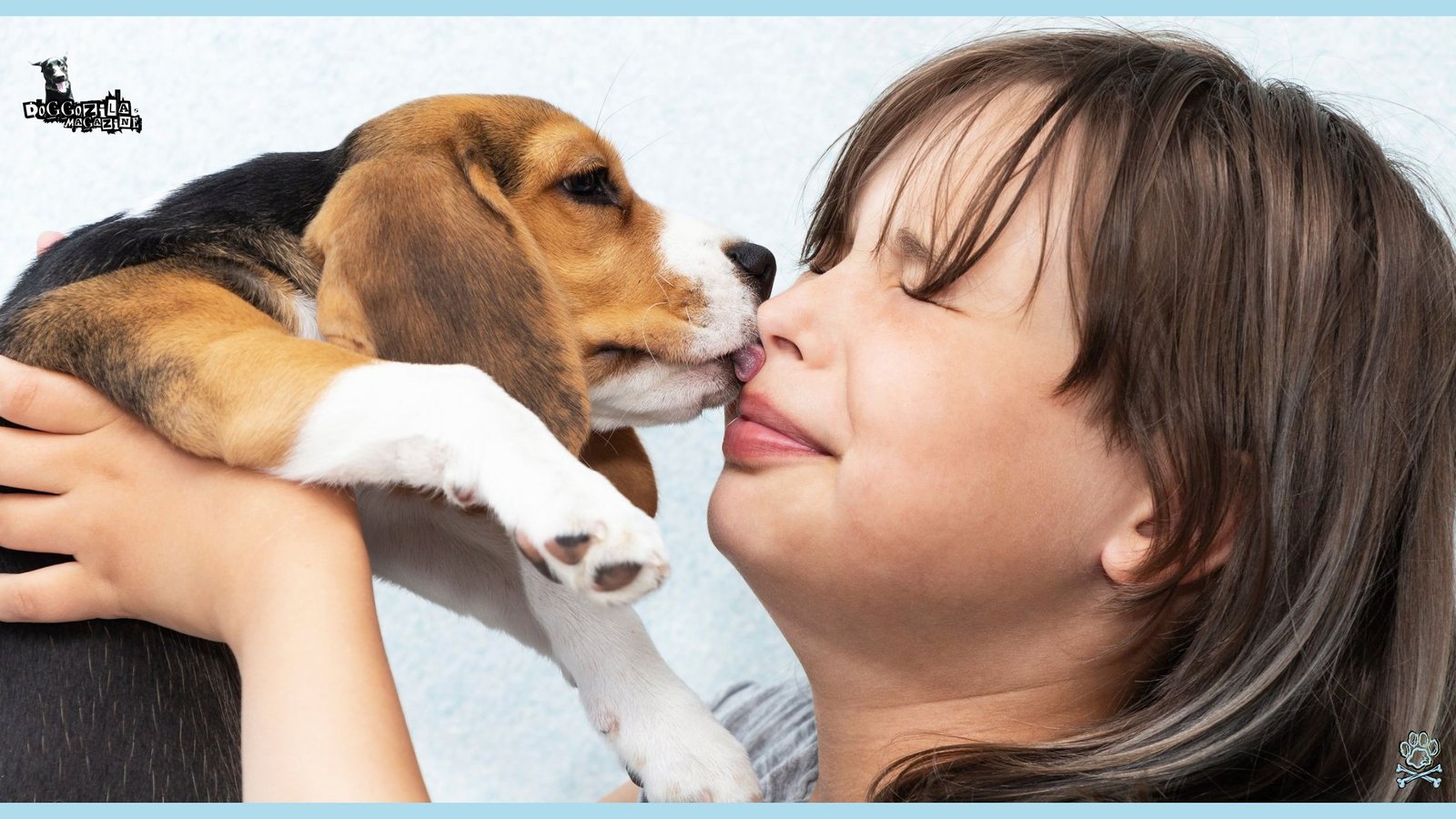
It’s a complex language that every dog parent should learn it!





